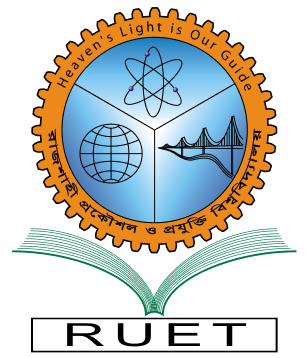The mandate of Sustainable Development Goal 15, Life on Land, revolves around “Protect, restore and promote sustainable use of terrestrial ecosystems, sustainably manage forests, combat desertification, and halt and reverse land degradation and halt biodiversity loss.” As an engineering and technology institution, RUET focuses its resources on developing technical solutions for land degradation, promoting sustainable urban planning, and minimising its ecological footprint through campus greening and waste valorization.
Academic Integration and Specialized Planning
Core Academic Focus: The Department of Urban and Regional Planning (URP) and Civil Engineering (CE) serve as central contributors to advancing knowledge aligned with SDG 15. Their curriculum includes specialized modules on Environmental Impact Assessment (EIA), Sustainable Land Use Planning, Geotechnical Stability, and the Economic Valuation of Ecosystem Services, ensuring that future engineers and planners integrate ecosystem health into their development practices.
Combating Land Degradation and Erosion
Land Preservation Research: RUET’s ongoing research directly addresses land degradation and erosion resulting from riverine activities in the Rajshahi region. The Civil Engineering department leads projects on slope protection, geotechnical risk mitigation, and the development of sustainable construction materials that reduce reliance on sand and soil extraction—thereby preventing further land degradation.
Biodiversity Protection and On-Campus Greening
Ecological Enhancement Efforts: RUET promotes biodiversity through tree plantation drives and the maintenance of designated green belts that serve both ecological and educational functions. These areas act as living laboratories where students study species interaction and ecological management. The URP department conducts applied studies on optimizing urban green spaces in Rajshahi City, contributing data to support municipal efforts toward biodiversity and climate resilience in urban environments.
Sustainable Resource Management and Waste Valorization
Closing the Resource Loop: RUET applies circular economy principles in its approach to waste management and land restoration. Research within the Mechanical and Chemical Engineering departments explores innovative valorization of agricultural and organic waste—such as composting and biochar production from biomass. These by-products are applied as natural soil enhancers, helping to restore degraded soils, increase organic carbon content, and improve fertility in the surrounding regions.
Community Engagement and Policy Advocacy
Local Collaboration: RUET’s faculty and students actively participate in outreach programs that address long-term terrestrial ecosystem health. The URP department collaborates with local government agencies on regional development plans emphasizing sustainable land use, ecological zoning, and the mitigation of urbanization’s effects on agricultural and forested lands around Rajshahi.
Interdisciplinary Research on Ecosystem Resilience
Bridging Disciplines for Sustainability: RUET promotes interdisciplinary research that integrates engineering with environmental science. The Institute of Energy and Environmental Studies (IEES) conducts studies on the impact of climate change on land productivity and agroforestry systems, providing actionable, data-driven recommendations for climate adaptation and sustainable land resource management under increasing environmental stress.
